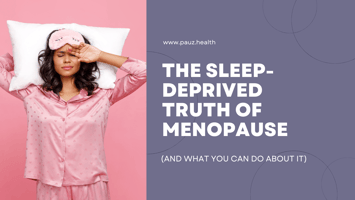As you ascend the ladder of professional success, juggling deadlines, meetings, and perhaps even...
Hot Flashes, Hold the Hormones?
%20(2240%20x%201260%20px).png?width=960&height=540&name=Untitled%20(560%20x%20420%20px)%20(2240%20x%201260%20px).png)
Let's get one thing straight: If one more person tells you to 'just eat soy' for your hot flashes and menopause symptoms, you have every right to launch a block of tofu across the room.
According to research, hot flashes occur in 75 to 80% of North American women during menopause. As the most common symptom recognized during menopause (keep in mind women are often unaware other symptoms are related to menopause!), there is often a narrative that soy: soy beans, tofu, soy milk, can help with hot flashes and night sweats. We are here to clarify the evidence!
Wait... What Are Phytoestrogens Again?
Phytoestrogens are basically plant imposters — natural compounds that look a lot like estrogen and can kind of act like it, too. They bind to your estrogen receptors (ERα and ERβ, if you want to impress someone) and either gently nudge them awake (agonist) or block them from being bossed around by stronger stuff (antagonist).
Translation: They may help ease menopause symptoms like hot flashes, without going full HRT. But — and it’s a big BUT and MAY— they are not all created equal.
The Main Characters (AKA The Phytoestrogen Squad)
Isoflavones
-
Found in soybeans, tofu, soy milk, red clover, and alfalfa.
- Most research has focused on isoflavones (red clover) as it has a higher affinity for estrogen receptor binding
-
Found in legumes (like chickpeas and alfalfa sprouts), spinach, split peas, and brussels sprouts.
Lignans
-
Found in flaxseed (the queen bee), sesame, sunflower, and pumpkin seeds, as well as whole grains, berries, and even wine (cheers to that).
🔥 So... Do They Actually Help?
The short answer? Sometimes. The long answer? It depends.
💦 Hot Flashes & Night Sweats
-
The best evidence is for isoflavones (especially red clover).
-
A 2021 JAMA meta-analysis showed a modest reduction in hot flashes (around 20–25%). Other reviews have found mixed results.
-
BUT: many studies have small sample sizes, inconsistent dosing, and major placebo effects (one trial showed placebo reduced hot flashes by 59% — talk about mind over menopause).
🫀 Heart Health
-
Eleven human studies looked at lignans and cardiovascular risk — about half showed benefit.
-
Most of us in the West don’t eat enough lignans (hi, processed food), so your mileage may vary.
🦴 Bone Health
-
Mixed and inconclusive results. Some promising signals, but not enough for your orthopedic doc to get excited.
🧠 Cognition
-
Lignans may boost verbal memory in late perimenopause.
-
Coumestans? No effect.
-
Isoflavones? Maybe, but probably not enough to help you remember where you put your glasses.
🎗️ Breast, Uterine, and Prostate Cancers
-
Countries with high isoflavone intake (like Japan) tend to have lower rates of breast, endometrial, and prostate cancer.
-
Phytoestrogens have not been shown to increase cancer risk, even in survivors — but always check with your doctor if you have a hormone-sensitive history.
🧬 Why It Works for Some (and Not for Others)
-
Gut microbiota: Some lucky people convert isoflavones into “equol,” which is like the VIP form of phytoestrogens. If your gut doesn’t make equol, you may not get the same benefits.
- Dose & Concentration: The type of phytoestrogen influences the concentration consumed as dose the volume or amount, therefore impacting results.
-
Ethnicity: East Asian women report fewer hot flashes than North American women — possibly due to soy-rich diets, but also potentially due to cultural, genetic, and lifestyle differences.
💊 Food or Supplements?
-
Whole foods = generally safe and gentle (think edamame, flax crackers, miso soup).
-
Supplements = proceed with caution. Quality varies wildly. Red clover extract (like Promensil) has the most data, but even that’s mixed.
-
Not a replacement for HRT — but may have some influence on menopausal symptoms.
- Dose & Duration: Effects seem best with 40–80 mg/day for at least 8–12 weeks.
🥦 Final Verdict?
Phytoestrogens are not a replacement for HRT. But they might have some benefits — especially if you’re consistent, patient, and maybe a little soy-curious.
So eat your tofu. Toss some flaxseed in your smoothie. Just don’t fall for the hype that phytoestrogens can fix it all.
For $4.99/month, you receive access to evidence-based information, expert interviews, webinars, live events, support with health and wellness lifestyle enhancements, and discounts for events, programs, and our marketplace.
Follow us on our socials!
.png?width=50&name=Take%20control%20over%20(13).png)


